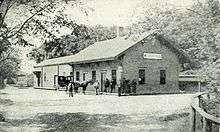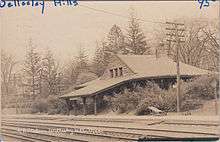Wellesley Hills (MBTA station)
WELLESLEY HILLS | ||||||||||||||||||||||||||
|---|---|---|---|---|---|---|---|---|---|---|---|---|---|---|---|---|---|---|---|---|---|---|---|---|---|---|
|
Wellesley Hills station platforms; station building is at right | ||||||||||||||||||||||||||
| Location |
339 Washington Street Wellesley, Massachusetts | |||||||||||||||||||||||||
| Coordinates | 42°18′37″N 71°16′37″W / 42.3102°N 71.2770°WCoordinates: 42°18′37″N 71°16′37″W / 42.3102°N 71.2770°W | |||||||||||||||||||||||||
| Owned by | MBTA | |||||||||||||||||||||||||
| Line(s) | ||||||||||||||||||||||||||
| Platforms | 2 side platforms | |||||||||||||||||||||||||
| Tracks | 2 | |||||||||||||||||||||||||
| Construction | ||||||||||||||||||||||||||
| Parking | 51 spaces ($4.50 fee) | |||||||||||||||||||||||||
| Other information | ||||||||||||||||||||||||||
| Fare zone | 3 | |||||||||||||||||||||||||
| History | ||||||||||||||||||||||||||
| Opened | 1834 | |||||||||||||||||||||||||
| Rebuilt | March 13, 1886 | |||||||||||||||||||||||||
| Services | ||||||||||||||||||||||||||
| ||||||||||||||||||||||||||
Wellesley Hills is a regional rail station on the MBTA Commuter Rail Framingham/Worcester Line, located off Washington Street (MA-16) in Wellesley, Massachusetts. Designed in 1885 and completed in 1886, the station was the last of nine stations that H.H. Richardson designed for the Boston and Albany Railroad. It replaced a previous station, built in 1834 with the completion of the Boston and Worcester Railroad.
Wellesley Hills has two low platforms serving the line's two tracks; it is not handicapped accessible.
History


The Boston & Worcester Railroad (B&W), extending outwards from Boston, reached through the West Parish of Needham in mid-1834.[1] North Needham station was the terminus for a few months while construction continued towards Worcester.[2] In 1839, the line was double tracked through the area.[3]
The station was later renamed Grantvile, then briefly Nehoiden, and finally Wellesley Hills in 1881 when the West Parish was fully separated from Needham as the town of Wellesley.[2]
Wellesley Hills station was designed by Henry Hobson Richardson in 1885 for the Boston & Albany Railroad,[4] and was the last in a series of stations he designed, all featuring rough-cut light colored stone with dark stone trim around windows and doors, slate roofs, and varying amounts of decorative dark stone carvings.[4] As a B&A station, it originally served both commuter trains in the Boston Metropolitan Area and long distance trains toward Albany, New York.
Though the platforms are still active for railroad service today, the station house is currently occupied by two private businesses: an art gallery,[5] and a dry cleaning store. The portion facing the street has been renovated and the original roofing has been removed.[6] However, the sides and back of the building have been preserved, though the windows are boarded up and large air conditioning units have been installed.[7] The previous station building, constructed in 1855, has been moved across the street and converted to a private residence.[8]
References
- ↑ Humphrey, Thomas J. & Clark, Norton D. (1985). Boston's Commuter Rail: The First 150 Years. Boston Street Railway Association. pp. 21–25. ISBN 9780685412947.
- 1 2 Fiske, Joseph E.; Ellen W. Fiske (1917). History of the Town of Wellesley, Massachusetts. Boston, Chicago: The Pilgrim Press. p. 26. OCLC 6541911 – via Internet Archive.
- ↑ Karr, Ronald Dale (1995). The Rail Lines of Southern New England. Branch Line Press. pp. 278–283. ISBN 0942147022.
- 1 2
- Ochsner, Jeffrey Karl, H.H. Richardson: Complete Architectural Works, MIT Press, Cambridge MA 1984
- ↑ AZ Fine Arts
- ↑ AZ Fine Arts - About Us
- ↑ Richardson stations
- ↑ Harwood, Herbert H. (Spring 1992). "History Where You Don't Expect It: Some Surprising Survivors". Railroad History (166): 103–125. JSTOR 43523701. (subscription required (help)).
External links
| Wikimedia Commons has media related to Wellesley Hills (MBTA station). |
- MBTA -Wellesley Hills
- Cliff Road entrance from Google Maps Street View
- Station from Google Maps Street View